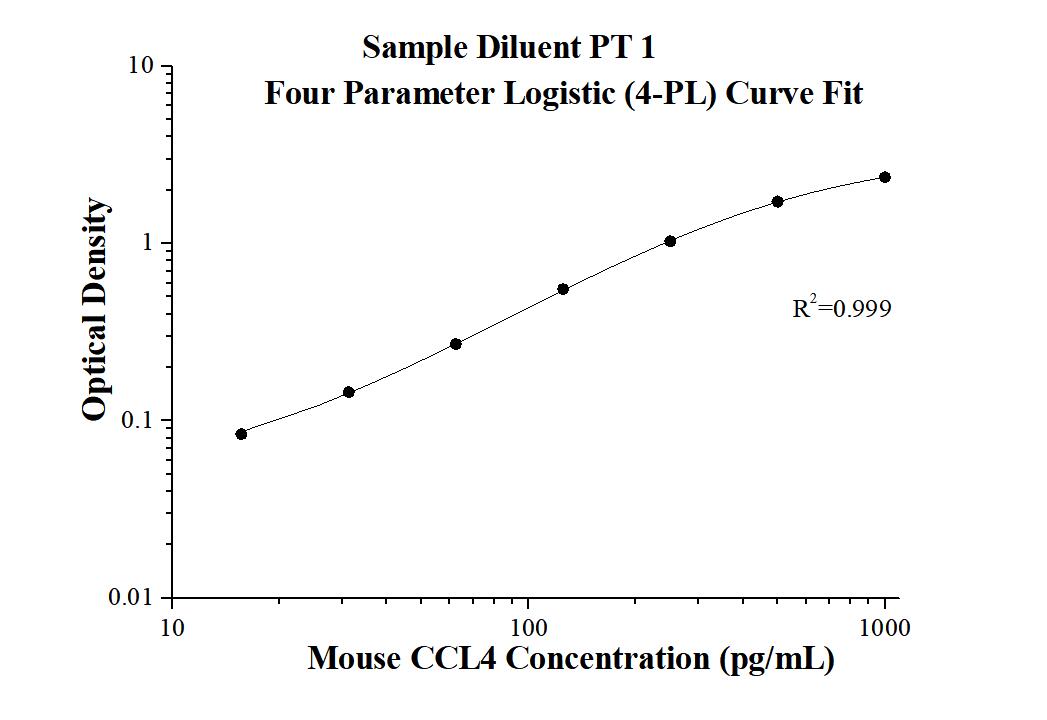Mouse CCL4 ELISA Kit
Cat no : KE10030
Synonyms
Act 2, AT744.1, Ccl4, chemokine (C C motif) ligand 4, MIP 1B, Mip1b, Scya4
Validation Data Gallery
Product Information
KE10030 is a solid phase sandwich Enzyme Linked-Immuno-Sorbent Assay (Sandwich ELISA). The Mouse CCL4 ELISA kit is to be used to detect and quantify protein levels of endogenous mouse CCL4. The assay recognizes mouse CCL4. An antibody specific for mouse CCL4 has been pre-coated onto the microwells. The mouse CCL4 protein in samples is captured by the coated antibody after incubation. Following extensive washing, another antibody of biotinylated specific for mouse CCL4 is added to detect the captured mouse CCL4 protein. For signal development, Sterptravidin-HRP is added, followed by Tetramethyl-benzidine (TMB) reagent. Solution containing sulfuric acid is used to stop color development and the color intensity which is proportional to the quantity of bound protein is measurable at 450 nm with the correction wavelength set at 630 nm .
| Product name | Mouse CCL4 ELISA Kit |
| Tests | 1 X 96 well plate |
| Sample type | Cell culture supernatant |
| Assay type | Sandwich |
| Sensitivity | 5.0 pg/mL |
| Range | 15.6-1000 pg/mL |
| Reactivity | Mouse |
| Tested applications | Sandwich ELISA |
| Gene ID (NCBI) | 20303 |
Recovery
| Sample Type | Average | Range |
|---|---|---|
| Cell culture supernatant | 101% | 85%-110% |
IntraAssay
| Sample | n | mean ( pg/mL) | SD | CV% |
|---|---|---|---|---|
| 1 | 20 | 502.9 | 19.4 | 3.9 |
| 2 | 20 | 121.2 | 3.5 | 2.9 |
| 3 | 20 | 61.9 | 1.6 | 2.6 |
InterAssay
| Sample | n | mean ( pg/mL) | SD | CV% |
|---|---|---|---|---|
| 1 | 24 | 486.5 | 26.2 | 5.4 |
| 2 | 24 | 117.0 | 3.2 | 2.7 |
| 3 | 24 | 60.8 | 2.9 | 4.8 |
Background Information
CCL4(C-C chemokine ligand 4), also known as MIP-1β, plays a key role in inflammation and immune regulation. CCL4 is a major HIV-suppressive factor produced by CD8+ T cells. CCL4 is produced by a wide variety of cells including: immune cells (monocytes, B and T cells), fibroblasts, endothelial, and epithelial cells. CCL4 has a broad spectrum of target cells including immature dendritic cells, which express the cognate receptor CCR5. Increased expression of CCL4 was reported in the monocytes and blood of elderly individuals. Concentration of CCL4 within the body increases with age, which may cause chronic inflammation and liver damage.
Properties
| Storage Instructions | All the reagents are stored at 2-8℃ for 6 months or -20℃ for 12 months. Refer to the protocol for further storage instructions. |
| Synonyms | Act 2, AT744.1, Ccl4, chemokine (C C motif) ligand 4, MIP 1B, Mip1b, Scya4 |
Publications
| Species | Sample Type | Title |
|---|---|---|
Neuropharmacology CCR5 antagonist maraviroc alleviates doxorubicin-induced neuroinflammation and neurobehavioral deficiency by regulating NF-κB/NLRP3 signaling in a breast cancer mouse model |
